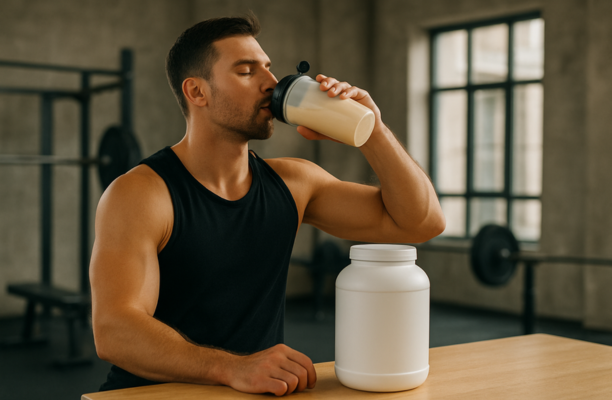Whey protein has become a staple for fitness lovers, athletes, and anyone aiming to build lean muscle or improve recovery. But simply buying whey protein products isn’t enough — knowing how to take whey protein after a workout is what truly determines your results. Timing, dosage, and choosing a good quality whey protein all play a crucial role in muscle repair, strength improvement, fat loss, and overall performance.

In this detailed guide from Meibotan, you’ll learn the right way to consume whey protein post-workout, the benefits of using healthy whey protein, and how to make sure you get the most out of every scoop.
Why Whey Protein Matters After a Workout
When you train — especially during weightlifting or high-intensity workouts — your muscle fibers undergo stress and tiny tears. To rebuild stronger muscle tissue, your body needs quick, high-quality protein.
This is where whey protein products stand out.
Whey is rapidly absorbed, rich in amino acids, and contains a high amount of leucine — the key amino acid responsible for triggering muscle protein synthesis (MPS). This process is essential for whey protein muscle building, recovery, and strength gains.
After a workout, your body is in a prime state to absorb nutrients. This is known as the anabolic window, which lasts for about 30–60 minutes.
Taking whey protein during this window ensures:
Faster muscle repair
Reduced soreness
Increased strength
Better performance in the next session
How to Take Whey Protein After Workout
Taking whey protein seems simple — just mix and drink. But the right approach makes a big difference. Here’s a complete breakdown:
1. Take Your Whey Protein Within 30–60 Minutes Post-Workout
This is the golden time frame when your muscles are most receptive to nutrients. Drinking a shake immediately after training ensures amino acids reach your muscles fast.
Why it works
Whey gets digested in under an hour, compared to chicken or eggs that may take over 3 hours. This rapid digestion maximizes muscle growth.
2. Mix Whey Protein With Water for Faster Absorption
While many people love blending whey with milk, for post-workout use, water is the best choice.
Water helps:
speed up digestion
reduce overall calorie intake
ensure amino acids reach muscles sooner
Milk slows digestion slightly due to fats and lactose — great for meal replacement but not ideal immediately after exercise.
3. Recommended Dosage: 1 Scoop (24–30g Protein)
Most athletes and gym-goers need around 20–30 grams of protein after a workout. This amount is perfect for stimulating muscle protein synthesis without overloading your system.
Taking more than 40g at once doesn’t give extra benefits — your muscles can utilize only so much protein at a time.
4. Choose a Good Quality Whey Protein
Not all whey powders are made the same. To support optimal recovery, always pick a good quality whey protein that contains:
Low sugar
Zero harmful additives
High protein percentage per scoop
Complete amino acid profile
Natural ingredients
Look for labels like Whey Protein Isolate or Whey Protein Concentrate depending on your fitness goals.
A good rule: the fewer the unnecessary ingredients, the better the quality.
5. Add Carbohydrates for Better Muscle Recovery
A post-workout shake becomes even more effective when paired with a fast-digesting carb source. This helps replenish glycogen levels and supports muscle repair.
Good options include:
Banana
Oats
Dates
Honey
You can blend them into your shake for extra nutrition and improved recovery.
6. Stay Hydrated Along With Your Protein Shake
Whey protein absorbs better when your body is well-hydrated. Drinking water before and after your shake improves digestion and supports metabolism.
Aim for at least 200–300 ml of water with your shake.
Benefits of Taking Healthy Whey Protein After Workout
Using healthy whey protein has numerous advantages, especially when consumed correctly after training:
1. Faster Muscle Growth
Whey delivers essential amino acids that promote whey protein muscle development, helping you gain lean mass more efficiently.
2. Reduces Muscle Soreness
Whey helps repair muscle tissue faster, reducing the pain and stiffness that typically appear 12–24 hours after training.
3. Boosts Strength and Performance
Consistent post-workout whey intake supports strength gains as muscles recover faster and more effectively.
4. Supports Fat Loss While Maintaining Muscle
Whey protein builds lean muscle, which boosts metabolism. This helps your body burn fat more efficiently — even while resting.
5. Improves Overall Recovery
Healthy whey protein supports immune function, energy levels, and nutrient absorption, all contributing to quicker recovery and better long-term performance.
Common Mistakes to Avoid When Taking Whey Protein After Workout
Even the best whey protein products won’t be effective if used incorrectly. Avoid these mistakes:
Skipping your post-workout shake
Overloading with sugars or high-calorie foods
Mixing with milk immediately after training
Taking too much protein at once
Using low-quality, cheap whey powders
Consistency and timing matter more than anything else.
Who Should Take Whey Protein After a Workout?
Whey protein benefits more than just bodybuilders. It’s great for:
Gym beginners
Athletes
Runners
People aiming to lose fat
Those looking to gain muscle
Busy professionals needing quick nutrition
Anyone struggling to meet daily protein goals
If you want faster recovery and better workout results, whey protein is for you.
Use Whey Protein the Right Way for Maximum Results
Understanding how to take whey protein after a workout can make a huge difference in your fitness journey. Whether your goal is muscle gain, fat loss, or improved strength, using healthy whey protein consistently — and correctly — ensures optimal recovery.
Choose Meibotan good quality whey protein for clean, effective, and scientifically formulated nutrition. With the right whey protein products and smart post-workout habits, you’ll see better results, improved muscle tone, and enhanced performance.


Write a comment ...